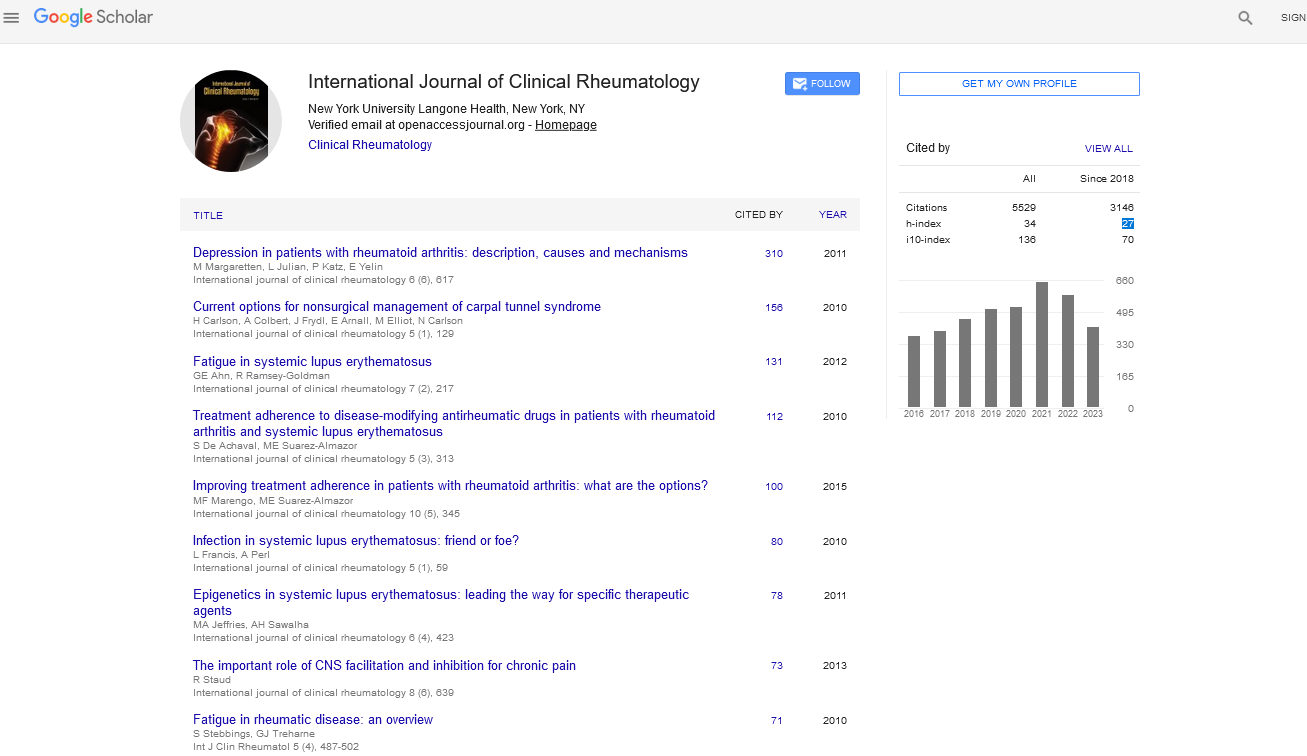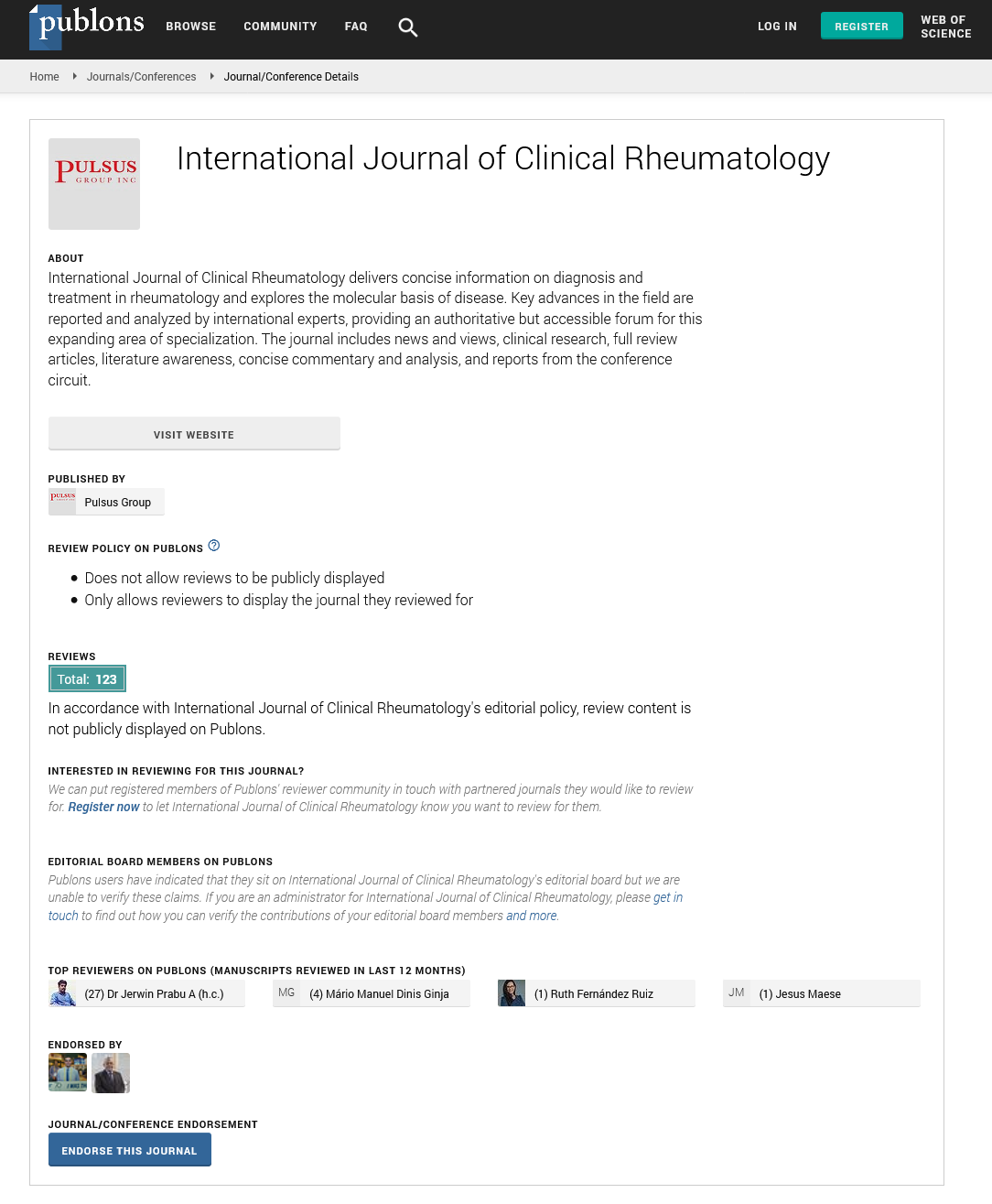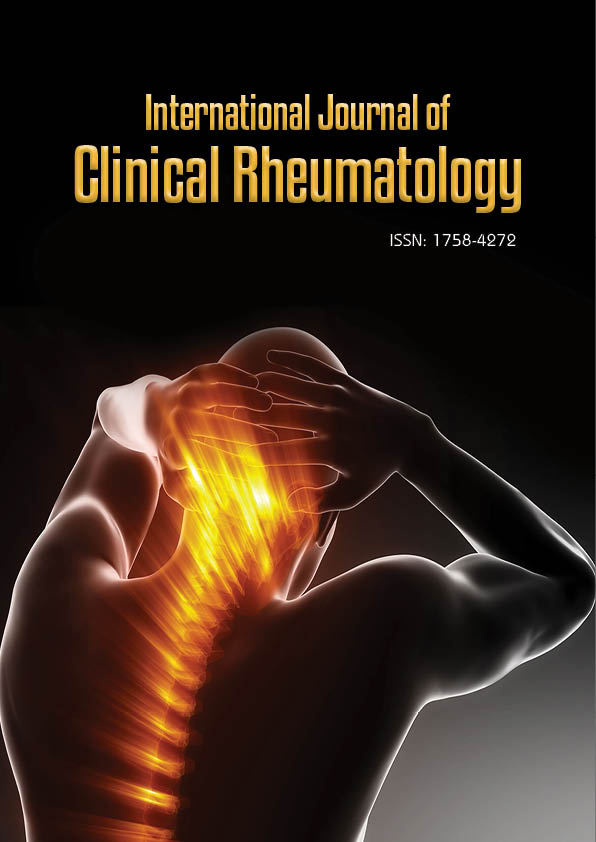Mini Review - International Journal of Clinical Rheumatology (2023) Volume 18, Issue 1
The French Society for Rheumatology has simplified the operating procedures for treating rheumatoid arthritis
Claire Daien*
Department of rheumatology, hospital Lapeyronie, avenue du Doyen-Giraud, France
Department of rheumatology, hospital Lapeyronie, avenue du Doyen-Giraud, France
E-mail: Daien_dc@gmail.com
Received: 03-Jan-2023, Manuscript No. fmijcr-23-86562; Editor assigned: 05- Jan-2023, Pre-QC No. fmijcr-23-86562 (PQ); Reviewed: 19-Jan-2023, QC No. fmijcr-23-86562; Revised: 24-Jan- 2023, Manuscript No. fmijcr-23-86562 (R); Published: 30-Jan-2023, DOI: 10.37532/1758-4272.2023.18(1).015-017
Abstract
The 2014 French Society For Rheumatology (Société Française De Rheumatologie, SFR) Recommendations About The Operation Of Rheumatoid Arthritis (RA) Have Been Streamlined By A Task Force Composed Of 12 Expert Rheumatologists, 2 Case Tone- Help Group Representatives, And An Occupational Therapist. The Material Used By The Task Force Included Recent EULAR Recommendations, A Methodical Literature Review, And Expert Opinion. The General Principles Emphasize The Need For Participated Decision- Making Between The Rheumatologist And The Case And For A Global Operation Program Including Both Pharmacological And Non-Pharmacological Treatments. The Recommendations Deal With The Individual Strategy For RA, Treatment Targets, Operation Association, and Medicine Selection Grounded On The Treatment Line And Prognostic Factors, Operation Of Remittals, And Global Case Operation. Disease- Modifyinganti-Rheumatic Medicine (DMARD) Remedy Should Be Started As Beforehand As Possible. Validated Compound Scores Should Be Determined At Regular Intervals To Assess Complaint Exertion – According To The Tight Complaint Control Conception – To Achieve The Treatment Target, I.E., An Absolution. Methotrexate Is The Recommended First- Line DMARD. The Treatment Should Be Optimized When Methotrexate Is Inadequately Permitted Or Deficiently Effective. While Staying For Conventional Synthetic BDMARDs To Take Effect, Glucocorticoid Remedy Can Be Used, For A Brief Period To Keep The Accretive Cure Low. When A Sustained Absolution Without Structural Progression Is Achieved In A Case That Isn't Taking Glucocorticoid Remedy, Targeted Remedied-Escalation According To Tight Complaint Control Principles Should Be Considered. Cases Should Be Periodically Screened For Comorbidities And Their Threat Factors, Which Should Be Estimated And Treated
Keywords
COVID- 19 • Long COVID • Infection
Introduction
Since 2014 when the rearmost recommendations about the operation of rheumatoid arthritis (RA) were issued by the French Society for Rheumatology (Société Française de Rheumatologie, SFR) new data have been published [1-5]. Therefore, new information is available on pharmacological treatments (including recently retailed medicines and remedial strategies, especially for cases in absolution), non-pharmacological treatments (recuperation and remedial patient education (TPE)), and comorbidities. Recommendations must be streamlined regularly grounded on the current literature to insure that they give optimal guidance to all those involved in managing RA, thereby further perfecting the quality of life, functional issues, and survival of cases with RA. The European League against Rheumatism (EULAR) has also conformed to this necessity, issuing updated recommendations about RA and early arthritis in 2016 [6, 7].
French recommendations about RA end to deal with all the confines of RA operation including the opinion, treatment, followup, operation of remittals, and operation of comorbidities. Although primarily intended for rheumatologists, they may be useful also to other croakers who give care to cases with RA similar as primary- care croakers, as well as to other healthcare professionals, medical scholars, patient tone- help associations, and health authorities.
Therefore, the ideal of this work was to modernize SFR recommendations on managing RA in order to give cases with optimal operation.
Material and Method
The SFR convened a task force of 12 sanitarium- or community- grounded rheumatologists, 2 cases with RA who were members of case tone- help associations, and an occupational therapist. The material used by the task force included the 2014 SFR and 2016 EULAR recommendations for the operation of RA and early arthritis. In addition, a methodical literature review was conducted by 2 task force members( CD and CH) to recoup data published between completion of the literature review for the earlier recommendations( i.e., between Janember 2015 and February 2016 depending on the item) and October 2017. The methodical literature review involved quests of Medline ( via PubMed) and a review of objectifications published at the 2016 and 2017 meetings held by the EULAR and American College of Rheumatology( ACR). The ideal of the literature review was to identify lately published data of use for answering 11 questions preliminarily linked by the task force. These questions appertained to the time to RA treatment inauguration, with the window of occasion conception; opinion, prognostic, and treatment of RA, as well as treatment strategies; operation of remittals; and global case operation including the operation of comorbidities. In January 2018, the task force drafted the update to the SFR recommendations, which was also perfected via several dispatch rounds. The recommendations were also reviewed by a panel of 40 experts including sanitariumand community- grounded rheumatologists, other healthcare professionals, and cases designated by patient tone- help associations. Each panel member scored each recommendation on a 0 – 10 Scale where 0 indicated complete disagreement and 10 complete agreement. The wording of some of the recommendations was modified according to the commentary made by the panel. The position of the beginning substantiation and the grade of each recommendation were determined.
Discussion
Exploration continuously provides new information about colourful disciplines related to RA including the development of new treatments, the contriving of remedial strategies, and the use of on-pharmacological treatments. This strong dynamic requires that operation recommendations be streamlined regularly to insure that healthcare professionals involved in minding for cases with RA can conform their practice to the most recent knowledge. Thus, in 2018, the SFR decided to modernize its former recommendations issued in 2014.
This new set of SFR recommendations comprises four general principles and 15 recommendations covering the full range of RA operation disciplines including the opinion, pharmacological and non-pharmacological treatments, patient follow- up, and the operation of comorbidities [8, 9].
The new recommendations cross at numerous points with those issued in 2014, specially regarding the central part for the rheumatologist in the operation of cases with RA; the need for a remedial cooperation between the case and the rheumatologist; the significance of furnishing a global operation program encompassing both the RA and any comorbidities and counting not only on specifics, but also on non-pharmacological means similar as recuperation remedy and TPE; and, eventually, the need for attention to the individual and societal costs of RA. Eventually, as was the case in 2014, the updated recommendations punctuate the significance of establishing the opinion and starting the treatment of RA as early as possible.
Still, the 2018 recommendations also differ in several ways from those issued in 2014. The tsDMARDs lately introduced into the French request are bandied. The task force decided to give equal significance to JAK impediments and to bDMARDs. Another difference compared to 2014 is the statement that switching to a drug with a different medium of action in the event of primary treatment failure deserves preference. Eventually, lesser emphasis is placed on promoting a healthy life and managing the comorbidities as a fullfledged element of the operation of RA.
Utmost of the recommendations are grounded on a high position of substantiation, attained a high position of agreement, and entered strong grades. Except for general principle B, the position of agreement with each general principle and recommendation was lower among review panel members than among task force members presumably in part because the review panel didn't have access to the full textbook of the recommendations. The commentary made by the review panel generally involved issues that had been bandied by the task force and developed in the textbook accompanying each recommendation. Given the continuing active exploration into RA, these recommendations will presumably need to be streamlined in a many times [10].
Acknowledgement
We thank the members of the review panel who read and reflected on the recommendations Baudens G, Beauvais C, Berenbaum F, Berthelot J- M, Boumier P, Brocq O, Constantin A, Devauchelle- Pensec V, Dixneuf V, Fayet F, Flipo R- M, Gaudin P, Goeb V, Goupille P, Grange L, Hudry C, Jousse- Joullin S, Le Goff B, Marotte H, Mezieres M, Morel J, Perdriger A, Pham T, Pouplin S, Roth O, Ruyssen- Witrand A, Schaeverbeke T, Sellam J, Senbel E, Soubrier M, and 10 cases designated by the AFP RIC and ANDAR.
Conflict of Interest
None
References
- Lin YJ, Anzaghe M, Schülke S et al. Update on the Path mechanism, Diagnosis, and Treatment Options for Rheumatoid Arthritis. Cells. 9, 880 (2020).
- De Cock D, Hyrich K. Malignancy and rheumatoid arthritis: Epidemiology, risk factors and management. Best Pract Res Clin Rheumatol. 32, 869-886 (2018).
- Aletaha D, Smolen JS. Diagnosis and Management of Rheumatoid Arthritis: A Review. JAMA. 320, 1360-1372 (2018).
- Kondo N, Kuroda T. Kobayashi D Cytokine Networks in the Pathogenesis of Rheumatoid Arthritis. Int J Mol Sci. 22, 10922 (2021).
- Huang J, Fu X, Chen X et al. Promising Therapeutic Targets for Treatment of Rheumatoid Arthritis. Front Immunol. 12, 686155 (2021).
- Zhou S, Zou H, Chen G et al. Synthesis and Biological Activities of Chemical Drugs for the Treatment of Rheumatoid Arthritis. Top Curr Chem (Cham). 377, 28 (2019).
- Giollo A, Bissell LA, Buch MH et al. Cardiovascular outcomes of patients with rheumatoid arthritis prescribed disease modifying anti-rheumatic drugs: a review. Expert Opin Drug Saf. 17, 697-708 (2018).
- Dai Y, Wang W, Yu Y et al. Rheumatoid arthritis-associated interstitial lung disease: an overview of epidemiology, pathogenesis and management. Clin Rheumatol. 40, 1211-1220 (2021).
- Jegatheeswaran J, Turk M, Pope JE et al. Comparison of Janus kinase inhibitors in the treatment of rheumatoid arthritis: a systemic literature review. Immunotherapy. 11, 737-754 (2019).
- Singh JA, Tornberg H, Goodman SM et al. Pop a pill or give myself a shot? Patient perspectives of disease-modifying anti-rheumatic drug choice for rheumatoid arthritis. Joint Bone Spine. 88, 105053 (2021).
Indexed at, Google Scholar, Crossref
Indexed at, Google Scholar, Crossref
Indexed at, Google Scholar, Crossref
Indexed at, Google Scholar, Crossref
Indexed at, Google Scholar, Crossref
Indexed at, Google Scholar, Crossref
Indexed at, Google Scholar, Crossref
Indexed at, Google Scholar, Crossref
Indexed at, Google Scholar, Crossref


